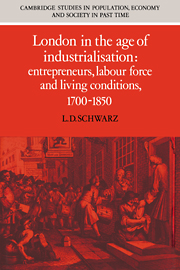Book contents
- Frontmatter
- Contents
- List of figures
- List of tables
- Acknowledgements
- List of abbreviations
- Introduction
- Part I Wealth and occupations in London
- Part II Fluctuations and mortality in the metropolis
- 3 Trends, cycles and wars
- 4 Seasonal fluctuations
- 5 The population of London: the ending of the old regime
- Part III The standard of living and the London trades
- Conclusion: downstream from industrialisation
- Appendices
- Bibliography
- Index
- Cambridge Studies in Population, Economy and Society in Past Time
4 - Seasonal fluctuations
Published online by Cambridge University Press: 11 September 2009
- Frontmatter
- Contents
- List of figures
- List of tables
- Acknowledgements
- List of abbreviations
- Introduction
- Part I Wealth and occupations in London
- Part II Fluctuations and mortality in the metropolis
- 3 Trends, cycles and wars
- 4 Seasonal fluctuations
- 5 The population of London: the ending of the old regime
- Part III The standard of living and the London trades
- Conclusion: downstream from industrialisation
- Appendices
- Bibliography
- Index
- Cambridge Studies in Population, Economy and Society in Past Time
Summary
The pattern of seasonality
The long-term trend – even the cycle – was of far less importance to the daily lives of Londoners than were seasonal fluctuations in employment. Such fluctuations were inevitable. A mass market was insufficiently developed; the means of production and of transport were geared closely to the weather. Ships depended on the winds, while their cargoes might depend on the harvests of other countries; the food processing industries awaited the harvests, the sugar refineries awaited the West India fleet, the luxury trade and a host of services awaited the London Season.
The effects of these fluctuations, although less widely felt in towns than in the countryside, were more marked than in the late nineteenth century, when a mass market was more developed, and production and transport depended less on the weather or the vagaries of upper-class demand. However, as late as 1909 the maximum difference between the numbers employed in the building trades during the busiest and slackest months was 20 per cent, even though in the winter the men were only working a 44-hour week instead of the 50-hour week of summer. Stedman Jones has found variations of a similar extent in the 1880s. In the eighteenth century, fluctuations were much more severe. House painters, according to Campbell in 1747, were idle for four or five months in the year, though they were an extreme case as ‘there is not Bread for one Third of them’.
- Type
- Chapter
- Information
- London in the Age of IndustrialisationEntrepreneurs, Labour Force and Living Conditions, 1700–1850, pp. 103 - 124Publisher: Cambridge University PressPrint publication year: 1992

